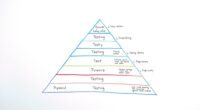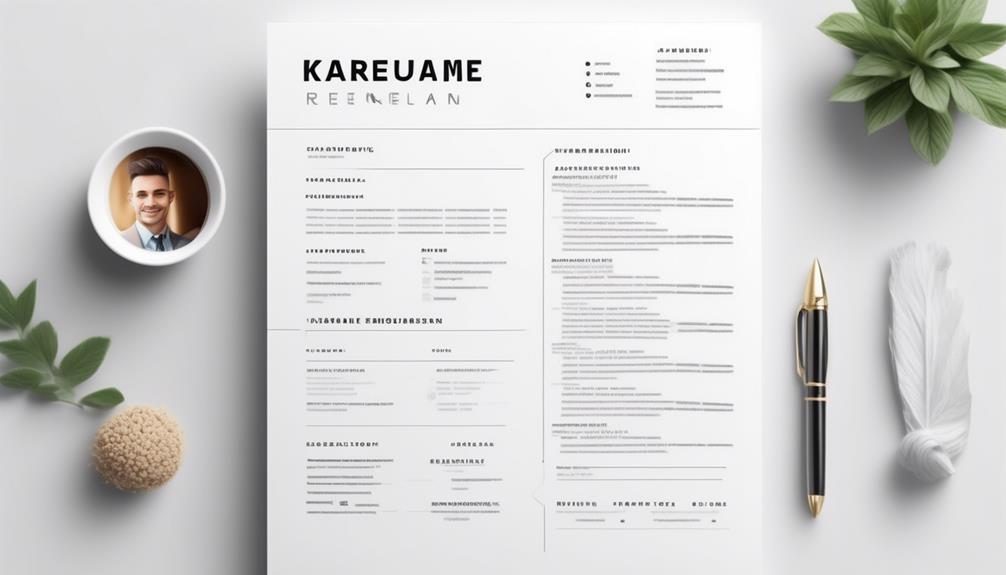To craft a killer QA resume in 2025, focus on showcasing your technical skills such as scripting, automation, and coding best practices, while providing clear examples of how these improve testing efficiency. Highlight your interview prep, certifications, and collaborative experience with cross-functional teams. Use targeted keywords and concise formatting to pass ATS filters. Including a balance of technical proficiency and communication skills will position you as a top candidate—continue exploring ways to refine your approach for maximum impact.
Key Takeaways
- Highlight technical skills like scripting, automation, and version control, demonstrating adherence to coding standards and best practices.
- Tailor your resume with relevant keywords from job descriptions to optimize for ATS and showcase your interview readiness.
- Showcase experience in testing methodologies, documentation, bug tracking, and cross-team collaboration to illustrate comprehensive QA expertise.
- Include certifications and proactive learning efforts that emphasize your commitment to staying current and improving processes.
- Present a balanced profile combining technical proficiency, communication skills, and problem-solving to position as a top candidate.

Crafting a standout QA resume is essential to landing your dream job in quality assurance. Your resume should immediately communicate your technical skills and your ability to guarantee software quality. One of the most important aspects to highlight is your understanding of coding best practices. Even if you’re not applying for a developer role, demonstrating that you adhere to coding standards shows you have a solid grasp of programming fundamentals, which is indispensable for effective testing and automation. Mention specific skills like scripting languages, version control, and automation tools to showcase your technical proficiency. When describing your experience, focus on how you’ve implemented coding best practices in previous roles, such as writing clean, maintainable test scripts or improving testing efficiency through automation.
In addition to technical skills, interview preparation plays a pivotal role in shaping your resume. Employers want to see that you’re not just technically capable but also well-prepared for the interview process. Use your resume to highlight your familiarity with common QA interview questions, testing methodologies, and problem-solving scenarios. For instance, mention experiences where you’ve successfully navigated technical interviews or contributed to team discussions that led to process improvements. This demonstrates your proactive approach and readiness for the interview stage. Be sure to include any certifications or training you’ve completed that relate to interview preparation, such as courses on behavioral or technical interview techniques.
Your resume should also reflect your ability to communicate effectively, a skill that’s indispensable during interviews and in collaborative work environments. Include examples of how you’ve worked with developers, product managers, or cross-functional teams to identify issues and implement solutions. Highlight your experience with testing documentation, bug tracking, and reporting, emphasizing clarity and precision. Use action verbs like “developed,” “implemented,” and “optimized” to show your active role in quality assurance processes. Additionally, understanding the importance of coding standards in QA can help you better articulate your technical competency during interviews.
Finally, tailor your resume for each application. Use keywords from the job description, especially those related to coding best practices and interview preparation, to pass Applicant Tracking Systems (ATS). Keep your resume concise, well-organized, and free of jargon that might confuse non-technical recruiters. Remember, your goal is to present yourself as a well-rounded QA professional who combines strong technical skills with excellent communication and preparation. By emphasizing these qualities, you’ll stand out as a top candidate ready to contribute from day one.
Frequently Asked Questions
How Important Are Soft Skills in a QA Resume?
Soft skills are essential in a QA resume because they highlight your communication skills and teamwork ability. Employers seek candidates who can effectively collaborate with developers and communicate issues clearly. Demonstrating strong soft skills shows you’re a team player and can handle dynamic environments. Including examples of your interpersonal skills can set you apart, proving you’re not just technically proficient but also vital for a cohesive, productive team.
Should I Include Certifications or Only Practical Experience?
You should include both certifications relevance and practical experience emphasis on your QA resume. Certifications show your commitment and technical knowledge, making you stand out, especially if they’re industry-recognized. However, practical experience demonstrates your real-world skills and problem-solving ability. Balance both to showcase your qualifications thoroughly. Highlight certifications that directly relate to the job, and detail your hands-on experience to prove your capabilities effectively.
How Do I Tailor My Resume for Different QA Roles?
You can’t just send out the same resume to every QA role—you’re aiming to conquer every niche! Tailor your resume by highlighting your expertise in coding standards and testing methodologies relevant to each position. Showcase specific projects where you mastered different testing techniques or adhered to industry coding standards. This targeted approach makes your skills shine brighter, proving you’re the perfect fit for each unique QA role.
What’s the Ideal Resume Length for QA Professionals?
You should keep your QA resume concise, ideally one to two pages, to guarantee clear resume formatting that highlights your skills and experience. Focus on your career objectives early on, making them specific to QA roles. This helps recruiters quickly see your value. Keep your descriptions focused and impactful, using active voice. A well-organized, tailored resume shows your professionalism and makes it easier for hiring managers to assess your fit.
How Can I Showcase My Automation Skills Effectively?
To showcase your automation skills effectively, highlight your experience with automated testing tools and frameworks like Selenium, Appium, or JUnit. Emphasize your scripting proficiency in languages such as Python, Java, or JavaScript. Include specific projects where you improved testing efficiency or reduced bugs through automation. Quantify your achievements, like increasing test coverage or decreasing testing time, to demonstrate your impact clearly and make your resume stand out.
Conclusion
Crafting a standout QA resume isn’t just about listing skills; it’s about demonstrating your ability to solve problems and guarantee quality. Believe it or not, including real-world examples of your work can boost your chances considerably. When you showcase your achievements with confidence and clarity, you make it easier for recruiters to see your value. So, stay authentic, keep learning, and remember—your resume is your first impression. Make it count!









